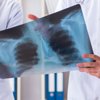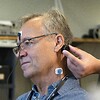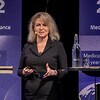Fritextsökning
Artiklar per år
Innehållstyper
-

He saved lives with his theories – was ostracised and ended up in a mental hospital
Hungarian doctor Ignaz Semmelweis (1818-1865) undoubtedly possessed plenty of persistence, diligence and sound reasoning skills – but he was hardly blessed with luck and timing.
-

"Unclear proposal from the EU Commission on how to solve the MDR challenges"
Even before the EU regulation on medical devices (MDR) came into force, medical technology companies and doctors were concerned that it would endanger the availability of medical devices in the EU. Unfortunately, the fears have come true.
-

The new Astra Zeneca CEO: “An incredibly exciting phase”
Almost 27 years have passed since Per Alfredsson from Södertälje stepped into Astra Zeneca as a newly hired engineer. After countless different roles, including heading the production of the company’s Covid vaccine, he is now advancing to the absolute top.
-

Sedana får snabbspår i USA för sin inhalationssedering
Sedana Medical har beviljats så kallad Fast Track Designation i USA för sin kombination av läkemedlet isofluran och den medicintekniska produkten Sedaconda för sedering av intensivvårdspatienter.
-

Sweden is organising a large life science conference as part of the EU presidency
On 26-27 June, Sweden will host a European meeting on life science.
-

“Everyone is screaming for talent”
Attracting talent is one of the life science industry’s major future challenges, which was one of the conclusions of the panel discussion that ended the New Horizons in Biologics & Bioprocessing conference on 15 December.
-

Missnöjd med din julklappsslips? Här är våra läsetips
-

Höstens mest lästa krönikor
Här nedan läser du de mest lästa krönikorna i Life Science Sweden och systertidningen Medtech Magazine från hösten och vintern.
-

Astra Zeneca nådde inte mål i lungcancerstudie
-

Läkemedelsjätten får bakläxa - IGN fäller läkares uttalande om "prisvärdhet"
Sakligt korrekt eller ej — en läkare får inte på uppdrag av ett läkemedelsföretag förorda en viss behandling framför andra. Det slår Informationsgranskningsnämnden (IGN) vid Lif fast och fäller Pfizer för att ha brutit mot det etiska regelverket i sin
-

ALS – When the body has given up, but the brain persists
The nerve disease ALS gradually deprives the patient of control over the muscles and, eventually, also of speech. The eyes continue to function, though, and with the help of, among other things, a Swedish-developed invention, communication with the outside world can continue. “It’s their window to the world,” says ALS researcher Caroline Ingre.
-

Synact köper schweiziskt bolag — medtechprofiler går in som ägare
Bioteknikbolaget Synact har tecknat avtal om förvärv av schweiziska TXP Pharma, som utvecklar läkemedel mot autoimmuna och inflammatoriska sjukdomar. Samtidigt genomför bolaget en nyemission på 80 miljoner kronor.
-

“Photon counting in computed tomography is the holy grail”
Erik Fredenberg, a researcher in physics at KTH and GE, is working to implement photon-counting CT in clinics. To shorten lead times and reduce the radiation dose in patients, he is setting out to develop a framework for virtual clinical trials for the technology.
-

Great Swedish innovations: Eye treatment became a feather in Pharmacia’s cap
From complicated and sometimes risky surgery to a routine procedure. Pharmacia’s injectable Healon revolutionised the field of eye surgery - and is considered by us one of the most important contemporary Swedish innovations in the field of medicine.
-

New study: Post-Covid symptoms are common even after mild Covid-19
According to researchers at the University of Gothenburg, loss of smell and taste, shortness of breath and chest symptoms are the most common complaints after a mild Covid infection.
-

Medtech-företag blev årets snabbväxare
Medtech-bolaget Infosolutions toppar årets rankning från Deloitte över Sveriges snabbast växande teknikbolag. På fyra år har bolaget ökat sin omsättning med 12 815 (!) procent.
-

She creates pharmaceuticals on a 3D printer
The correct dosage for each individual, regardless of whether the pharmaceutical is for a seriously ill child or a frail elderly person, is the mission of a well-advanced project with 3D-printed drugs at Uppsala University. “It will soon be available in clinics”, says Christel Bergström, who is heading the project.
-

Bubblarna på innovationslistan
Långt mer än 20 viktiga innovationer som hjälper personer till bättre hälsa har svenska upphovspersoner. Här skriver vi om ett urval av dessa som alla har kommit det senaste halvseklet.
-

The stomach medication that became the biggest blockbuster of the 1990s
The omeprazole molecule was synthesised as early as 1979, but it took many years before the then Astra had an approved pharmaceutical. Once this happened, a tablet was available that was soon to help millions of people worldwide and break all sales records.
-

Topplista innovationer: Hans uppfinning har gett 300 000 människor bättre hörsel
När Bo Håkansson i slutet av 1970-talet började utveckla den första benförankrade hörapparaten, BAHA, byggde han vidare på en fascinerande iakttagelse som två decennier tidigare gjorts av kollegan Per-Ingvar Brånemark.
-

The most important Swedish medical innovations: Our ranking
Life Science Sweden turns 20 years old – and celebrates by producing a top list of the 20 most important contemporary Swedish innovations in the field of medicine.
-

“We are Europe’s hotspot in life science”
The Medicon Valley Alliance has worked for competence development in life science in Denmark and Sweden for a quarter of a century. Anette Steenberg, CEO, sees the anniversary as a recognition of MVA’s explosive power.
-

Astra Zeneca i topp när naturvetare inom life science ska välja arbetsgivare
Fast anställning, varierande arbetsuppgifter och flexibla arbetstider är vad naturvetare inom life science helst vill erbjudas av sina arbetsgivare. Och flest tror att de hittar detta hos Astra Zeneca, enligt en undersökning bland Naturvetarnas medlemmar.
-

He is zooming in on topical preparations
According to Zelmic CEO David Sagna, topical products in drug development is a growing market, and to keep pace with the development, the company is awaiting approval for its new GMP facility.